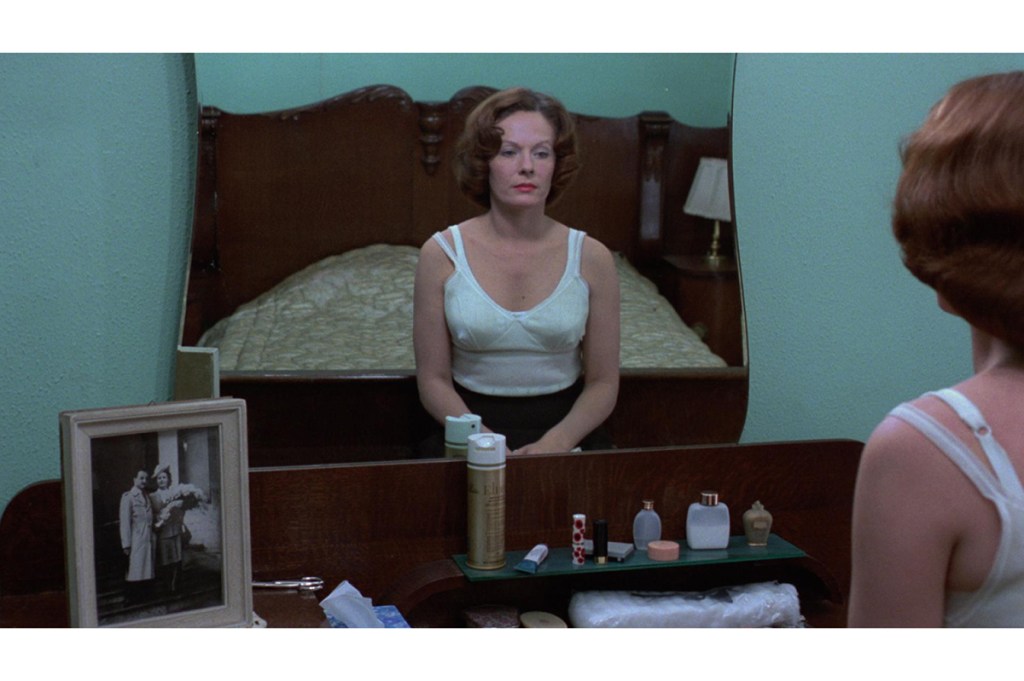In the era of boring Hollywood-Marxist blockbusters like Avatar: The Way of Water, it’s quite refreshing to see Jeanne Dielman, 23, quai du commerce, 1080 Bruxelles, a half-a-century-old masterpiece of European art cinema, proclaimed the best movie of all time by the 2022 Sight and Sound poll. Chantal Akerman’s 1975 film reached the top after a long delay, thereby confirming the fact that each present era retroactively rewrites its past.
Jeanne Dielman is fourth in the series of Sight and Sound‘s best films, preceded by Eisenstein’s Potemkin, Welles’s Citizen Kane and Hitchcock’s Vertigo. The film’s triumph is, of course, the result of a well-planned campaign to promote a woman to the top position. But what makes the film so refreshing today is that it so clearly belongs to another era when feminism did not yet largely regress into empty moralist rigor of cancel culture.
The film’s “plot” — the term is inappropriate here since the project of the movie is precisely to undermine the standard notion of plot — concerns a widowed mother’s regimented schedule of cooking, cleaning, mothering and running errands over three days. Even sex is part of the mundane routine she performs daily by rote; she earns money by having sex with a different client each afternoon before her son arrives home from school. After a visit by a client on the second day, Jeanne’s routine begins to unravel: she overcooks the potatoes; she forgets to cover the porcelain in which she keeps her money, misses a button on her house coat and drops a newly washed fork. But she goes on with her routine, until her client arrives on the third day. After orgasmic sex with him, she dresses herself, returns to bed and stabs him to death with a pair of scissors. She then sits quietly at her dining room table.
Akerman’s stroke of genius is her choice of Delphine Seyrig to play Jeanne. Seyrig was the highest example of French upper-class elegance; her most famous role was in Alain Resnais’s Last Years in Marienbad. In another of her movies, she tells a wonderful anecdote that illustrates the difference between plain good manners and true elegance. If a decent man enters an occupied bathroom by mistake and finds there a naked woman taking shower, he will say “So sorry, lady!” and quickly withdraw. But if he possesses true elegance, he will say “So sorry, sir!”, pretending that he even didn’t notice there the person under the shower is a woman and thereby minimalizing the embarrassment. Seyrig’s role in Jeanne is the very opposite of such elegance, but this contrast shouldn’t surprise us — Seyrig was a major figure of French feminism.
Jeanne is not merely plotless; it follows a rather straight line of raising tension which finally explodes. The palpable absence of a plot symbolizes the feminine position in a patriarchal society; a tension between the void of flat rituals and an invisible growing rage. This straight plotline is in its implications much more ambiguous than it appears — so what is it that appears? A radical condemnation of patriarchy which continues to oppress Jeanne even when the paternal figure is absent — here is an exemplary case of such a reaction to the movie:
As the subjugated, enslaved class, women are engaged in the routinized, menial labor without which the patriarchy could not be. The entire physical and psycho-emotional substrate of the apparatus of their oppression is entirely dependent upon their daily activities. Jeanne Dielman is not about revolution or the need for revolution so much as it is about the impossibility of a life devoted to a vacuous caretaking of a patriarchal regime even in the absence of an immediate patriarch. One of the amazing feats of this film is to portray prostitution as just another task in an endless never-ending drudgery which pauses but temporarily from exhaustion and the need to his sleep. Over the course of these three days, Jeanne increasingly can no longer bear the burden of the impossible task at hand. What seem initially like patriarchy-sanctioned “breaks for me” to have a cup of coffee or sit down once in a while are more and more moments where Jeanne can simply no longer do it.
In the film’s very last scene, Jeanne sits quietly at her dining room table in half-darkness. Is it then that her daily routine no longer allowed even the sanctioned breaks, so she had to kill a customer to be able to finally afford one? Her face shows traces of relaxation and expression, spontaneously making grimaces. This time, at last, she is no longer following rituals. Jeanne’s regime is an obsessional (compulsive-neurotic) defense against a threat of intense orgasmic enjoyment. But what happens, in a typical mechanism of reversal described by Freud, is that ritualized defense against enjoyment morphs into enjoying these defense rituals themselves. So why not have it both ways, enjoying rituals and enjoying direct sex itself? It doesn’t work: they are exclusive. It’s like having a cake and eating it. The surplus-enjoyment in Jeanne’s daily routine is clearly discerned in another user-submitted review of the film:
Every piece of furniture in her apartment is viewed over and over, and her daily routine is so minutely reviewed that it is imprinted in the mind; so, any tiny deviation jumps out as a sinister departure portending — what? You wait worriedly to find out what it could mean. You see a perfectionist at work as she proceeds through the day, as though the great care she is taking shining and folding and washing will somehow result in safety for her and the child. There is a spirituality in this, and it begins to take hold of you, and you fervently hope for her survival.”
True: but this hope is the ideological trap a viewer should avoid. The perfectionism we admire is precisely the same as that of Norman Bates who, in Psycho, thoroughly cleans the bathroom after killing Marion to erase all the traces of her presence. We are also automatically on his side. The “spirituality” that takes hold of us viewers is a truly weird one: the whole point of the film is to denounce it. So there is perhaps some meaning in the fact that Jeanne replaced Vertigo as the greatest film of all times: for me, Psycho was always Hitchcock’s true masterpiece. It is as if in Jeanne the dimension of Psycho missing from Vertigo returns with a vengeance.
Let’s imagine a Psycho-ized version of Jeanne. The first half would be told from the standpoint of the anonymous third customer who, after a boring day at work, visits a prostitute and is then unexpectedly killed by her, a kitchen-murder instead of a shower-murder. In the second half, Jeanne routinely erases the traces of the murder, disposes of the body, and then expects her son to arrive… In this version, it is the real Norman’s mother, living with her son, who is the murderer of her lovers (as was the case in the Psycho-prequel series Bates Motel).
Jeanne succumbs to her murderous explosion after an intense orgasmic sex — this is what ruins her plus-de-jouir, her enjoyment in obsessive rituals. What happened, what went wrong (or what went all too right?) after the sex on the second day, so that her routine began to unravel? The answer is simple: sex was no longer just another task in the daily routine; she began to enjoy it, making it impossible for her to enjoy her routine. When that enjoyment went too far, the only way out was to kill the person who brought her to it.
We should note that Jeanne’s daily routine is far from a typical woman’s life under the patriarchy. It’s easy to imagine how she could organize it differently: find a job and enjoy sex with a lover (or a new husband), etc. Is the film’s form — static camera, long shots, no point/counterpoint exchange — the actualization of Jeanne’s subjectless routine, of the absence of a proper intersubjective dynamic? Or is there a utopian moment in it? The static form would only fully fit her relaxed peace after the murderous outburst, while until that moment, even the dullest repetition is permeated by underground tension which finally explodes. Is the final scene a return to normalcy after her murderous explosion? Or is it the first moment of her true relaxation, of getting rid of the constant pressure to take care of things?
So what is wrong with her murderous explosion? The fact that it is not directed at the right target. Instead of stabbing her customer, she should have killed herself — in the symbolic sense of the second death: she should have committed a symbolic suicide, shed her socio-symbolic identity which is profoundly marked by patriarchal domination and resistance to it, and which contains its own fantasies and even narcissistic investments of victimization. In short, she should have committed “the gesture of giving up what one is — the shedding of narcissistic investments, and symbolic and fantasmatic identities – that proves a necessary first step to becoming what one is not, but might become.”
Her immoral act of killing does not imply a proper ethical stance; it remains a violent outburst, a negative reaction to a desperate predicament. A productive way of remaking the film would have been to imagine possible ways of providing ethical consistence to her violent outburst, not to replace it with cheap optimism.















